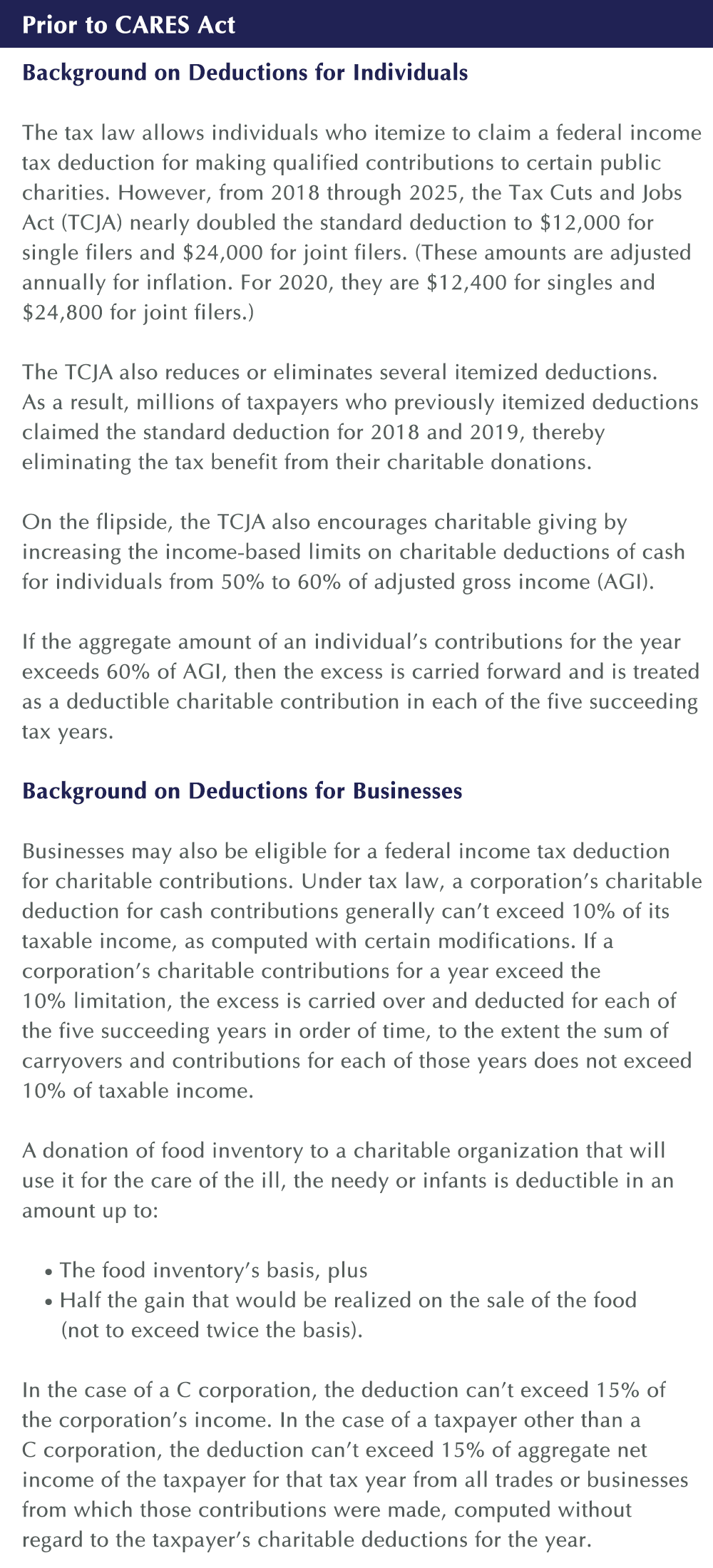The CARES Act includes several changes that encourage charitable giving during the coronavirus (COVID-19) crisis including: churches, educational organizations, hospitals, medical research organizations and food banks. Here’s an overview of the tax rules for deducting charitable contributions — and how they’ve temporarily changed for 2020.
CARES Act Changes
The CARES Act makes four significant changes to the rules governing charitable deductions:
1. For 2020, individuals will be able to claim an above-the-line deduction of up to $300 for cash contributions made to certain public charities. This rule effectively allows a limited charitable deduction to taxpayers who claim the standard deduction (rather than itemizing deductions) on their 2020 federal income tax returns.
2. For 2020, the limitation on charitable deductions for individuals that’s generally 60% of AGI doesn’t apply to cash contributions made to certain public charities. Instead, an individual’s qualifying contributions can be as much as 100% of AGI for 2020. No connection between the contributions and COVID-19 activities is required. This provision will benefit individuals who claim itemized deductions on their 2020 federal income tax return.
3. The limitation on charitable deductions for corporations that’s generally 10% of modified taxable income doesn’t apply to qualifying contributions made in 2020. Instead, a corporation’s qualifying contributions can be as much as 25% of modified taxable income. No connection between the contributions and COVID-19 activities is required.
4. For contributions of food inventory made in 2020, the deduction limitation increases from 15% to 25% of taxable income for C corporations and, for other taxpayers, from 15% to 25% of the net aggregate income from all businesses from which the contributions were made.
These CARES Act changes are for contributions made by individuals and businesses during the 2020 calendar year only. For charitable contributions made after December 31, 2020, the prior (pre-CARES Act) rules will apply. Fiscal year businesses which span calendar years must apply special rules to take advantage of these enhanced deductions and should consult their tax advisors.
Reap the Benefits
Have you been thinking about donating to a charity in the wake of the COVID-19 crisis? Are you a nonprofit looking for ways to encourage giving during this time? Philanthropic individuals are usually motivated by doing good, not tax benefits. But the favorable changes to the charitable contribution rules for individuals and businesses provide a well-deserved bonus. Fill out the form below and we can discuss your charitable-giving strategy for 2020.

Contact Us
© Copyright 2020 Thomson Reuters.
Disclaimer of Liability
Our firm provides the information in this article for general guidance only, and does not constitute the provision of legal advice, tax advice, accounting services, investment advice or professional consulting of any kind. The information provided herein should not be used as a substitute for consultation with professional tax, accounting, legal or other competent advisors. Before making any decision or taking any action, you should consult a professional advisor who has been provided with all pertinent facts relevant to your particular situation. Tax articles in this blog are not intended to be used, and cannot be used by any taxpayer, for the purpose of avoiding accuracy-related penalties that may be imposed on the taxpayer. The information is provided “as is,” with no assurance or guarantee of completeness, accuracy or timeliness of the information, and without warranty of any kind, express or implied, including but not limited to warranties of performance, merchantability and fitness for a particular purpose.
Blog
Nonprofit Insights

